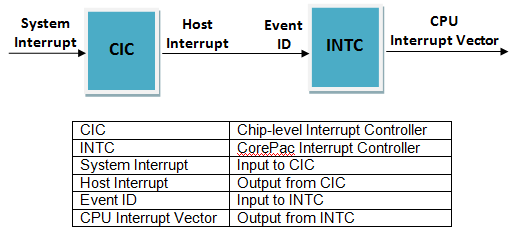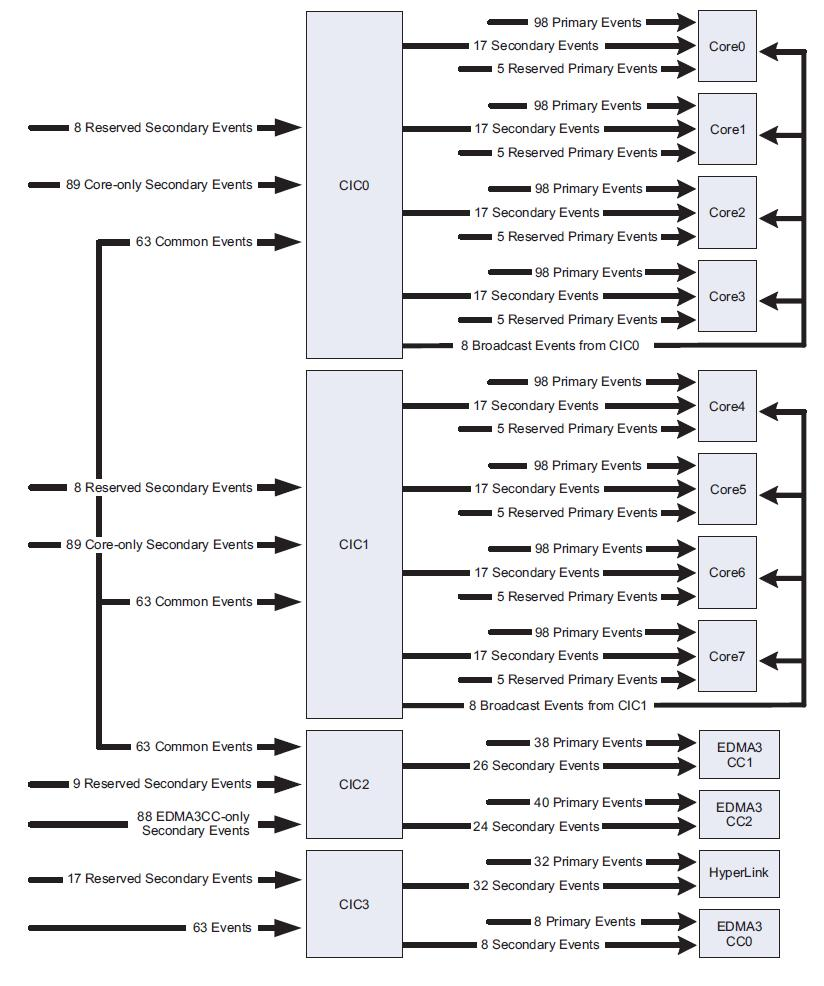catalogue
1, Two interrupt events for C66x
2. Mapping to secondary events through CIC
2, Method of interrupt configuration
a,configuring the CorePac's INTC
2. Interrupt configuration of sysbios
1, Two interrupt events for C66x
The CorePac interrupt controller allows 124 interrupts to be mapped to the DSP core and has events, as shown in the figure: events can be mapped separately
To the CPU, multiple events can also form a combination, and events can be mapped to the CPU.
At the same time, a CPU core has 16 interrupts, and 4-15 bits can mask configurable interrupts.
1. 98 primary events
Under SYSBIOS, HWI module can be used for direct configuration, and the hardware interrupt number can be queried from the interrupt manual.
If you do not run SYSBIOS, you need to configure the interrupt.
2. Mapping to secondary events through CIC
SYSBIOS does not support the direct mapping of CIC events to core interrupts, so first configure CIC and map system interrupt
It is Host interrupt. The Event id from Host interrupt to Event id is fixed, which can be queried in the manual; Next, perform the first step
Step.

2, Method of interrupt configuration
1.CSL method configuration
a,configuring the CorePac's INTC
Map Event ID63 to CPU interrupt 4
CSL_intcGlobalEnable() and CSL_intcGlobalNmiEnable() APIs
CSL_ The intcopen (...) API is an interrupt mapping. When the mapping is successful, the event will be saved to the interrupt and a valid handle will be returned.
CSL_intcPlugEventHandler(...) API binding event and interrupt functions
CSL_intcHwControl(...) API enable event
CSL_ The intcclose (...) API deallocates and releases events
b ,Configuring CIC
' pdk_C6678_x_x_x_xx\packages\ti\csl\example\cpintc 'you can learn more about CIC
c,Example
01
Note: host interrupt and channel in 6678 are one-to-one correspondence.
02
2. Interrupt configuration of sysbios
a. Create HWI thread
(refer to Sys BIOS tutorial for detailed methods, which will not be repeated)
Example event ID 10 is mapped to interrupt vector 5
b. Event Union
EventCombiner supports the combination of up to 32 events into one event. The output of EventCombiner can be connected to any configurable interrupt, and supports the combination of up to 32 * 4 events.
Support enable control of each event and interrupt function.

01
02
c,CpIntc
CpIntc manages CIC, which does not support interrupt nesting.
Turn on or off system and host interrupts,
system interrupts to host interrupts mapping (CIC)
host interrupts to HWIs, EventCombiner
There is a dispatch function for handling GEM hardware interrupts triggered by a system
interrupt. The Global Enable Register is enabled by default in the module startup function.
CpIntc APIs is 'ti.sysbios.family.c66.tci66xx.CpIntc'
Example
01
02